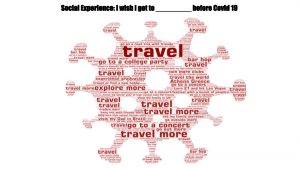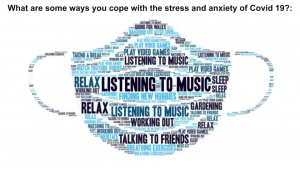8 SEA (Socially Engaged Art) Project: Covid #2
COVID #2 Group


Group members: Diana Muuru, Krishna Koul, Shady Zakhary, Leander Soriano, Ilham Shifow, Norec Del Castillo
Pravah ProjectSummary
The goal for our group is to find out how Covid 19 has affected people both mentally and socially in our lives. This idea can show how much of our society has changed and how different things are now in comparison to the pre-covid era. The idea for this project was to create a collage that consists of all the responses of the students’ experience within B CORE 133 E as well as some members and volunteers from Pravah. Our goal is to look at all the perspectives and experiences everyone has had with Covid 19, and all the impacts it has on everybody. Our first question relates to gratitude because it makes people reflect about things they took for granted before Covid 19 and now that people aren’t able to do most of these things. This level of self-reflection evokes a sense of gratitude for the things we once took for granted. Our second question relates to resilience because it shows how people combat and fight all the stress that this pandemic brings and how they power through it and stay resilient.
Statistics and Data
- Percentage of respondents in the U.S. who reported symptoms of anxiety disorder in the last seven days from April 2020 to February 2021:
- December 2020 percentage: 30.2%
- Percentage of respondents in the U.S. who reported symptoms of depressive disorder in the last seven days from April 2020 to February 2021:
- November 2020 percentage: 37.2%
- Percentage of workers who reported select mental health symptoms since the coronavirus outbreak in 2020*:
- Percentage more emotionally exhausted: 53.8%
- Suicide hotlines (and any other crisis hotlines that relate to this) have shot up a massive 8000% as a result of Covid-19.
Mental Effects
- Nearly 20 percent of COVID-19 patients developed a mental health issue — like depression, anxiety, or dementia — within 3 months of diagnosis, according to a new study. Researchers evaluated the health records of 69 million people in the United States, which included over 62,000 people diagnosed with COVID-19. Doctors have long suspected that COVID-19 was linked to higher rates of mental health problems.
- According to a KFF Health Tracking Poll, since lockdown started, 4 in 10 adults in the US have reported symptoms of anxiety or depressive disorders as opposed to 1 in 10 in 2019. Since covid started, it also has increased alcohol consumption and other forms of substance abuse by up to 32 and 12 percent respectively.
- According to an article published by The National Center for Biotechnology Information, Quarantine and self‐isolation can most likely, and in some cases will, cause a negative impact on one’s mental health.
- According to an article by The Commonwealth Fund, in the US, calls to mental health and/or suicide hotlines (and any other crisis hotlines that relate to this) have shot up a massive 8000% as a result of Covid 19
Social Effects
- People who are non-white are more likely to have to work as front-line workers or essential workers. 4 in 10 frontline workers are Black, Hispanic, or Asian American or Pacific Islander.
- This is significant because front line workers tend to be at a higher risk of contracting the virus.
- According to a study done by frontiersin.com, many people have been more cautious when it comes to protecting their health, however with all the death around us, it has invoked more livelihood in people to appreciate life more and realize that their time is precise; aka live life to the fullest
- This period was also seen as an evolution in the concept of empathy, producing new perspectives in the study of the phenomenon according to sociological and neurological points of view according to the same source
- According to an article made by The New York Times, Low income individuals are more likely to contract the coronavirus and to die from it.
- This is said to be because these people tend to be in crowded housing areas and tend to work essential jobs and that coupled with the fact that a lot of these people are not insured/underinsured, they’re more likely to die from the disease.
Works Cited
- https://www.healthline.com/health-news/people-with-covid-19-more-likely-to-develop-depression-anxiety-and-dementia
- https://www.kff.org/coronavirus-covid-19/issue-brief/the-implications-of-covid-19-for-mental-health-and-substance-use/?sc_referrer=android
- https://www.ncbi.nlm.nih.gov/pmc/articles/PMC7361582/
- https://www.commonwealthfund.org/blog/2020/long-term-impact-covid-19-mental-health?sc_referrer=android
- https://www.washingtonpost.com/health/2020/12/18/covid-vaccine-racial-equity/
- https://www.frontiersin.org/articles/10.3389/fpsyg.2020.577684/full
- https://www.nytimes.com/2020/03/15/world/europe/coronavirus-inequality.html
